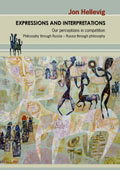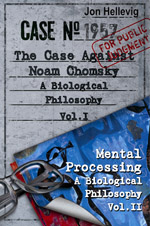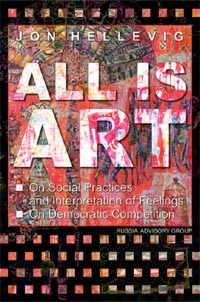|
|
| |
Empiricism, Intuition and A Priori
Intuition is a process where Infinite Variances act, react and interact. � Due to the Infinite Variances we are just not able to recognize the sources of knowing. - At the root of the �a priori�-error is the confusion between direct conscious contemplation and the continuous processing of experience gained from the Infinite Variances of situations we meet in life. � The anti-empiricists are perplexed with knowing something while not recognizing the instance of having learned it. This loosing of sight they call �a priori� � it is a notion to fill the gap between the certainty they have been taught to expect and the eternal flux of life. I propose they substitute this idea with �intuition�, which in fact is very similar while being a healthier notion; it is when a person seems to know something, but cannot trace the knowledge back to the origins of continuous life experience.
The whole point is (similarly to what Adam Smith showed in the economy) that life is such that what goes on does not follow any kind of �natural laws�, or captured forms of logic, nor are there causes and effects following a set pattern. All in social life is merely governed by the constant interplay between expressions and interpretations in the competitive system, as in a dance with Infinite Variances � some which seem more regular to us, some less.
Hume and empiricism
I note that I am very much in agreement with Hume�s philosophy. I think that the most important postulates of Hume�s philosophy are correct and coincide with those of Wittgenstein. However Hume was not in the position to perfect his style and arguments � he was so much in the vanguard of pragmatic philosophy that he did not have the luxury to build on a tradition of healthy arguments � it is so much easier to perfect good arguments, than first come up with them (although it is a mystery why the good arguments are picked up so slowly and by so few). � Hume was still not completely free from the mental restraints imposed by the language of things and the conceptual philosophy � although his main postulates de facto repudiated those ideas.
Hume and the ones adhering to the pragmatic tradition have always been in minority in comparison to the metaphysicians. �The main reason for this rather strange situation is that it is so much easier to convince with the language of things that words (the concepts) have a same kind of being as things proper. � It is much more difficult to convince that there are no such things (the proof is beyond the grammar). � And it is much easier to distribute a teaching of something purported to be, than refuting the being � it seems so natural that something has to be � (The burden of proof has been transferred to the healthy mind). � The British empiricists seemed dull to the majority involved in the spiritual tradition. The words of the language of things bends more beautifully for a description of things and anything put in the same role. � The language of pragmatic philosophy - the tools of common sense � inevitably loses in art appeal. For a person coming from a certain background and living in a certain time Hegel�s linguistic acrobatics will score more points than Hume�s mundane rebuttal of metaphysical nonsense.
A Critique of Pure Nonsense
Kant is said to have caused a Copernican revolution in philosophy � I argue that at best we can call it a Copernican contra-revolution (one of the most successful of its kind), where Kant has sided with the primitivist speculative forces against honest contemplation and a search for truth.
As a resume of Kant�s brand of �philosophy� I would like to point out these issues which demonstrate his errors:
1. There is no a priori
2. There is no formal logic
3. Expressions are not things, not in-themselves and not in any other respect either
4. There are no laws of thought
5. There are no causes and effects (in social life, i.e. in language)
6. Whatever is claimed to be �the transcendental� cannot be known (by Kant�s very own definition of transcendental � therefore in philosophy we must remain silent thereof).
Kant�s philosophy is in essence a conceptual philosophy. A correct philosophy should be based on the opposite notion: an understanding that the only way to gain new knowledge and to improve it is to, as far as possible, free one�s thinking from the particular concepts, and move beyond them
|
|

To download a free pdf file of this book, please click
here
To buy this book, please enter here (www.ruslania.com bookstore)

Click here to download free PDF file

Click here to download free PDF file

Click here to download free PDF file
|

